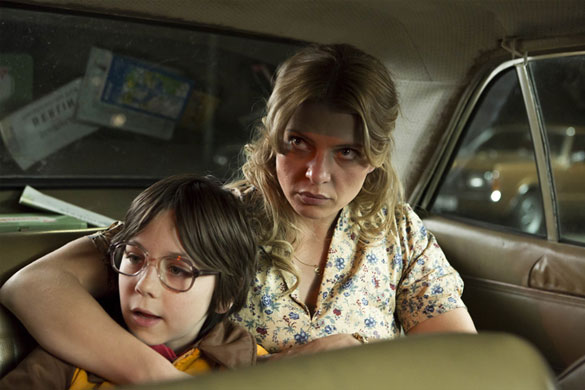West (Westen) ****
The world may have forgotten life before ‘Reunification’ in October 1990, but the divisions are still there today, bubbling below the surface. Director Christian Schwochow’s film West (Westen) follows one young East German mother and child’s experience of making the dangerous journey to the West, long before Reunification was even considered a reality. West leaves you unsettle, using its microscopic focus on one family to intensify the paranoia felt at the time.
After the death of her Russian scientist partner in Moscow, Nelly Senff (Jördis Triebel) finally decides to illegally cross Berlin’s East-West German border in the late 70s with her young son Alexej (Tristan Göbel) to forget her past and make a new future. After a humiliating examination, she arrives and gets shelter and food at West Berlin’s Marienfelde Refugee Center, but the problems she thought she had left behind begin to haunt her again, as suspicion of Stasi sympathy is rife and life in the promised West is not as straightforward as she thought it would be.
It’s clear why Triebel picked up Best Actress gongs at Montréal World Film Festival 2013 and the German Film Awards 2014. The East Berliner makes a compelling lead, strong in character and determination, but without making Nelly too hard-nosed that we don’t empathise with her as the paranoia and need to protect grows. We ultimately want closure for Nelly at the end of her journey to ‘freedom’, something that Heide Schwochow’s (the director’s mother) screenplay – based on Julia Franck’s novel ¬- leaves up to you to decide whether Nelly has achieved in the end.
Watching this film from a parent’s perspective is a raw and emotive experience, as the urge to seek a better life for your offspring is the obvious hook. Naturally, with the global migrant crisis, the film is very current too. The casting of young Göbel as Alexej gives director Schwochow’s film its much needed hope. The young actor evokes a naïve spirit in a pensive Alexej that sadly gets knocked towards the latter part as reality sets in and he begins to see the struggles his mother is facing.
There is also the heart-felt addition of a ‘surrogate’ father figure in fellow defector Hans Pischke (Alexander Scheer) who is presented as a mysterious character with a dubious past and a possible threat to the mother and son. Ironically, he still provides the male protection Alexej needs that he can’t even guarantee for himself. This is where the story is at its strongest, in that we know little back story about all those that mother and son encounter, hence we are forever waiting for an unpleasant reveal, right up until the credits roll. This might frustrate some, but it’s West’s core strength – even Nelly’s past has a question mark beside it.
Although Jacky Ido’s secret service agent character John Bird is obviously there to hunt out Stasi and communist sympathisers among the refugees, his back story is equally sketchy and his reliability questionable. Like the other characters, we play a game of trying to figure out whether he is friend or foe for mother and child. However, Bird could have been further developed and less one-dimensional as merely ‘the face of the Allied Security Services’ in this.
West is an intense watch, perpetuated by the hand-held and urgent camerawork at moments. It relies on its strong characters to build the atmosphere and our imagination to fill in the deliberate gaps in their back stories. It certainly portrays the Schwochows’ personal input into getting the characters’ emotion just right – not too sentimental or too abstract to understand. In the end, the significance of the plight of the refugee is the overall impression that lingers.
4/5 stars
By @FilmGazer
